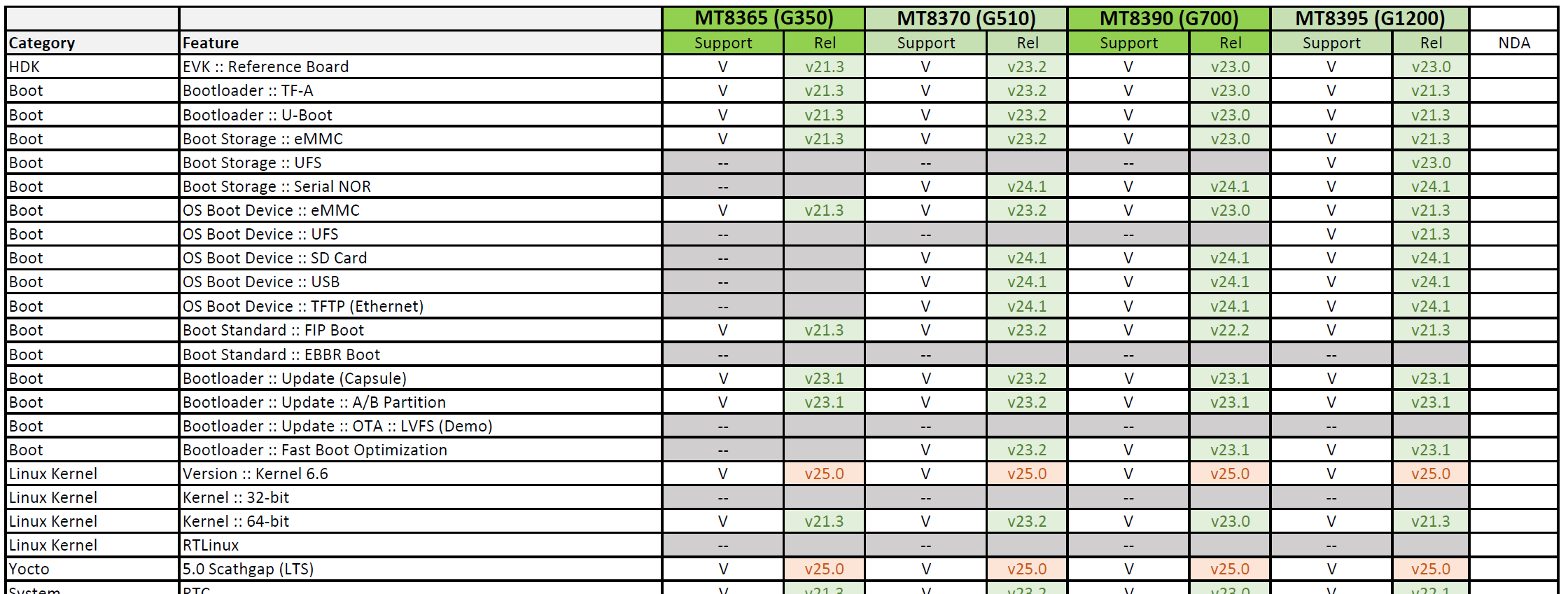IoT Yocto v25.0 - 2025 June 4
IoT Yocto v25.0 release supports Genio SoC families based on Yocto Scarthgap and Linux 6.6 This page provides an overview of the major changes in v25.0.
Supported Boards
This release supports the following boards based on MT8365(Genio 350/G350), MT8370(Genio 510/G510), MT8390(Genio 700/G700), and MT8395(Genio 1200/G1200) MediaTek SoC families:
Board Name |
|
|---|---|
|
|
|
|
|
|
|
Supported Software Features & Specs
Please go to IoT Yocto Feature Table (v25.0) to check the software support status for the IoT Yocto v25.0 release.
You may find the following materials in this document:
Feature Table: Supported software feature list of IoT Yocto for each platform
Bootloader Driver: Supported drivers for each boot stage
Build Flavor: Supported build flavors and included packages
Specification: Supported software specifications for USB, Display, Video-in (Camera, HDMI-RX), Video Codecs, MDP (multimedia data format converter and resizer), JPEG, Audio, Wi-Fi and Bluetooth
Benchmark Suites: Supported benchmark tools and their versions
Stress Suite: Supported stress tools and their versions
Suspend & Resume Table: Suspend and resume behavior of each driver
DTBO List: List of DTBO (Device Tree Blob Overlay)
Bin & License Release Modules: List of non-OSS modules and their licenses

A Segment of IoT Yocto Feature Table (v25.0)
Prebuilt Images Download
As part of the IoT Yocto v25.0 release, the following prebuilt images are provided for evaluation and debugging purposes. They are not suitable for production use.
Demo Images
These (private) demo images are built from the rity-demo-image recipe. They are configured to help you evaluate,
debug, and develop your own product images. These images are not suitable for production use, as they have various debugging options enabled.
Board |
Demo Image |
MD5 Checksum |
|---|---|---|
|
||
|
||
|
||
|
IoT Yocto v25.0 is available in two different package groups:
Note
You don’t need a GitLab account to download the prebuilt images, but you need to agree to the Software License Agreement.
You don’t need a GitLab account to build the public image configurations.
You need a GitLab account and contracts with MediaTek to access and build the private image.
Public images: Built with packages that are available without explicit access permissions to the GitLab group. Some proprietary features are excluded, and some proprietary components are provided in binary-only format.
Private images: Require access to private repositories in the GitLab group. The private image provides these additional features on top of the public configuration:
- Security features on all Genio platforms, including:
eFuse writer and custom data field access
RPMB access API
ISP for RAW sensors and YUV sensors support on Genio 510, Genio 700 and Genio 1200
You may find the binary modules and their licensing in the last page of the IoT Yocto Feature Table (v25.0).
Note
Starting from v24.0 release, we no longer provide prebuilt public images for evaluation, as their features are a subset of the
private images. Developers can still build images themselves using the NDA_BUILD = "0" configuration.
Source Code Download
Important
Please read and agree to the Software License Agreement before accessing or using IoT Yocto software. If you do not agree to the terms and conditions of the Software License Agreement, you must not access or use the software.
To download and build IoT Yocto recipes, please use the rity-scarthgap-v25.0 branch for the repo manifest file:
repo init -u https://gitlab.com/mediatek/aiot/bsp/manifest.git -b refs/tags/rity-scarthgap-v25.0
To fetch source code and build images using these Yocto recipes, please refer to steps in Build from Source Code
Tools
genio-tools is released to load built images to the development boards. Please refer to Get Started with IoT Yocto and Genio Tools for detailed usage.
Major Software Package Versions
Yocto LTS changed to Scarthgap 5.0.8
Linux kernel changed from 5.15 to 6.6.37
ATF version kept at v2.6
U-Boot version kept at v2022.10
OP-TEE version kept at 3.19
Mali GPU DDK version at r48
Major Changes
- Yocto has been upgraded from Kirkstone (LTS) to Scarthgap (LTS) for Genio 350, Genio 510, Genio 700, and Genio 1200
Note the last official Kirkstone release is v24.1. Starting from v25.0 we will only release Scarthgap
The kernel has been upgraded from 5.15 (LTS) to 6.6 (LTS).
All supported features are carried over from Kirkstone to Scarthgap unless explicitly mentioned below under EOL and Developing Features.
- New Features
PipeWire support on all Genio platforms
SOF (Sound Open Firmware) support on G350 HiFi4 DSP
MT7921 now supports SoftAP. Note that SoftAP/STA concurrent mode is not supported
- EOL Features
AI (VP6) support on G350
ARMNN support on G510, G700, and G1200
MT7663 Bluedroid support on G350
- Developing Features
Chromium Browser Hardware Acceleration (Genio 510, Genio 700, and Genio 1200) is still under integration with Scarthgap
HDMI CEC and HDCP (Genio 510, Genio 700, and Genio 1200) are not integrated in the v25.0 release. A separate patch will be provided
The external component MCP2518 CAN Bus Interface Controller on Genio 1200 EVK is not enabled
Idle and suspend low power are not fully optimized and are still under optimization
New Features
Pipewire (Genio 350, Genio 510, Genio 700, Genio 1200)
PipeWire is a next-generation multimedia framework for Linux that provides better compatibility with various applications and devices.
As of this release, only audio processing has been fully verified on Genio platforms.
SOF (Sound Open Framework) (Genio 350, Genio 510, Genio 700, Genio 1200)
In this release, Genio 350 with HiFi 4 DSP also supports SOF.
With SOF, users can develop their own audio DSP features, including processing pipelines, components, and infrastructure.
This is a POC feature. The reference driver is integrated, and the basic functionalities have been verified.
Users need to develop their own drivers and software modules based on their specific use cases.
MT7921 SoftAP (Genio 510, Genio 700, Genio 1200)
MT7921 now supports SoftAP mode, allowing the device to function as a Wi-Fi access point for other wireless clients.
Concurrent operation of SoftAP and STA (station) modes is not supported